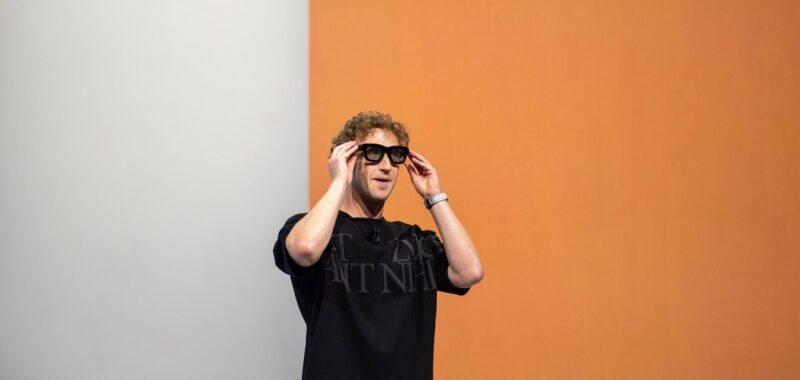Imagine putting on a pair of glasses and a bracelet that tracks your thoughts by sensing electrical impulses from your skin. Instantly, your field of vision overlaps with the digital world. You see holograms (3D digital avatars of real people), can project your own hologram, and even answer calls and play games while still being able to see what’s happening in the physical space around you.
This is the future that Mark Zuckerberg wants. At Meta Connect on Wednesday, Meta’s CEO revealed Orion, the company’s first, fully functioning prototype of holographic glasses.
Meta claims it is “the most advanced pair ever made.”
 Mark Zuckerberg wears Orion glasses. Credit: Andrej Sokolow/picture alliance via Getty Images
Mark Zuckerberg wears Orion glasses. Credit: Andrej Sokolow/picture alliance via Getty Images
Zuckerberg teased these glasses in previous interviews, telling YouTuber Kallaway in July that Orion, and its accompanying neural interface wristband, left early testers “giddy.”
At Meta Connect, the glasses were delivered to Zuckerberg on stage in a metal briefcase. Zuckerberg explained that about a decade ago, he started assembling a team to develop a pair of glasses that weighed less than 100 grams, operated wirelessly, had a wide field of view, supported holographic displays, were bright enough to see in different lighting conditions, and could be seen through.
“This is the physical world with holograms overlaid on it,” Zuckerberg said.
Related: Mark Zuckerberg Does a Better Job Than His Rivals at Explaining AI — And It’s Helping Meta Outperform Alphabet, Amazon and Microsoft
The glasses also had to support neural tracking.
“I think you need a device that allows you to send a signal from your brain to the device,” Zuckerberg said, adding that Orion “isn’t just the first full-screen wide field of view holographic AR glasses.”
“These are the first glasses to be controlled by a wristband that picks up on thoughts,” Zuckerberg said.
Zuckerberg and his team have achieved “most” of the goals they set out to accomplish with Orion. But before this prototype hits the shelves, Meta still has to fine-tune it. Employees and select outside testers will have access to Orion starting today as the company works on creating a better display, making the glasses smaller, and minimizing costs.
“We still have a few things that I want us to keep pushing on before we ship this as a consumer product,” Zuckerberg said, adding that the glasses were best thought of as “a time machine.”
Orion ties into Zuckerberg’s broader smart glasses strategy. The Ray-Ban Meta AI smart glasses that Meta released at last year’s Connect were a surprise hit, outselling the previous generation’s two-year sales in just a few months.
Related: She Sent a Cold Email to Meta Judging Its Ray-Bans. Now She Runs the Wearables Division.
“For a little while we were struggling to keep up with demand,” Zuckerberg said on Wednesday. “But we’re on top of that now.”
Zuckerberg’s plan for the Ray-Ban Meta glasses is to keep updating the AI and the look and feel. Over the next few months, the glasses will get a series of AI updates, including one that makes talking to Meta AI through the product more natural and conversational (so no need to keep saying “Hey Meta”) and another that adds real-time help from Meta AI with multimodal video (so you can look at your closet and ask the AI what kind of outfit you should wear to a party).
According to Zuckerberg, Meta AI has about 500 million monthly active users and is on track to be the most-used AI assistant by the end of this year.
“This is the beginning of a big thing,” Zuckerberg enthused.
Related: Nvidia CEO Jensen Huang Says Mark Zuckerberg’s Vision for the Future of AI Is a ‘Home Run Idea

